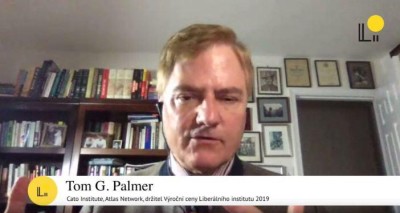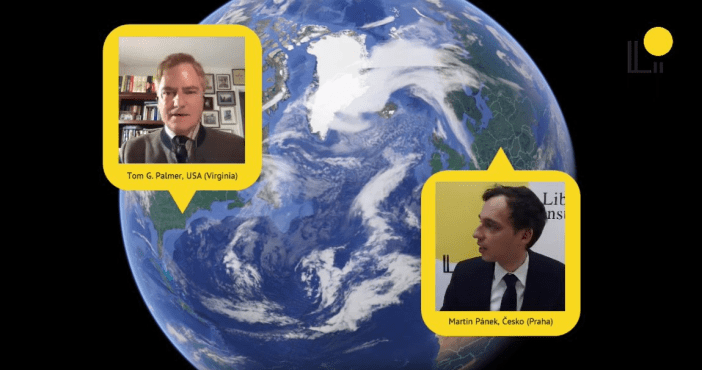Tom G. Palmer, an American philosopher, Vice-President of the Atlas Network, and a senior fellow at the Cato Institute, gave the 2019 Liberal Institute Annual Lecture and received the annual award. He became its 23rd recipient.
However, due to the COVID-19 crisis, for the first time, the annual lecture was held as a livestream and took place on YouTube on April 7, 2020, at 8:10 pm. Tom Palmer joined from his home in Virginia, USA, and we were broadcasting from the office of the Liberal Institute in Prague.
The annual lecture, together with the presentation of the Annual Award, is one of the main projects of the Liberal Institute, with which we began in 1995, when the first winner was the Nobel laureate Gary Becker. In addition to him, three other Nobel Prize winners received the award: Milton Friedman, James Buchanan, and Vernon Smith.
The prize is awarded “for contributing to proliferation of ideas of liberty and free competition, for honoring private property and the rule of law.”
Tom Palmer’s lecture was entitled “For Our Freedom and Yours and: How to Realize Your Own Freedom by Loving the Freedom of Others” and it dealt with liberalism in our region, what defines us as liberals, the current coronavirus crisis, previous freedom fighters, or how to promote our ideas.
Download Full Presentation [PPTX]
The lecture is well characterized by a quote from one of the slides:
“Educate your children, educate yourself in the love of the freedom of others, because just so your freedom will not be just a useless gift of destiny. You will know its value and you will have the courage to defend it.”
– Joaquim Nabuco, Brazilian abolitionist, diplomat, historian (1849–1910)
In the debate, viewers asked how to spread liberal ideas among non-liberals, whether the current voluntary activity of individuals confirms our ideas, whether the United States can be non-interventionist in foreign policy when communist China exists, whether the response of central banks and governments makes people think about their taxes or whether Tom Palmer is optimistic about liberalism.
 We also touched on the current situation in the USA, the Czech Republic, and Hungary. Tom Palmer also spoke extensively about his visits to Prague under communism and beyond.
We also touched on the current situation in the USA, the Czech Republic, and Hungary. Tom Palmer also spoke extensively about his visits to Prague under communism and beyond.
The annual lecture was hosted by the director of the Liberal Institute, Martin Pánek. He commented on the situation:
“In the thirty years of the Liberal Institute’s existence, we have learned very well how to organize lectures, seminars, press conferences, or even a summer school. We did a live broadcast for the first time, and immediately from the USA and from Prague at once. We have a lot to learn from it, but we hope it was interesting and beneficial for the audience.”
The director of the entire broadcast was Jan Bouša, who also provided all the technical support. Regarding the historically first live broadcast organized by the Liberal Institute, he noted:
“Although I have experience with the preparation and handling of similar broadcasts, it is always an experiment under new conditions. We had only some equipment borrowed free of charge and we were not sure in advance that it would have a sufficient capacity for our needs, nor did we have the time to perform thorough testing.
We only had a week to prepare all the visuals and negotiate the technical conditions with Tom G. Palmer. We found the specific location of the studio within the office space of the Liberal Institute and took the first sharp tests only five hours before the start of the broadcast.
During this time, we encountered a number of complications, with the transmission of the presentation, which was not possible according to the original plan and required considerable improvisation, or insufficient computing power of the computer for all our needs.
Mr Palmer and I negotiated the final details but a few seconds before the stream began. In these conditions, the broadcast turned out relatively satisfactorily, we managed to handle the sound at a good level (which is probably the most important for any lecture), and we had good-quality image, especially in the recording, which we published later. I was very pleased with the reactions of the audience, which were basically all positive, and I am very happy with that.”
Continue exploring:



